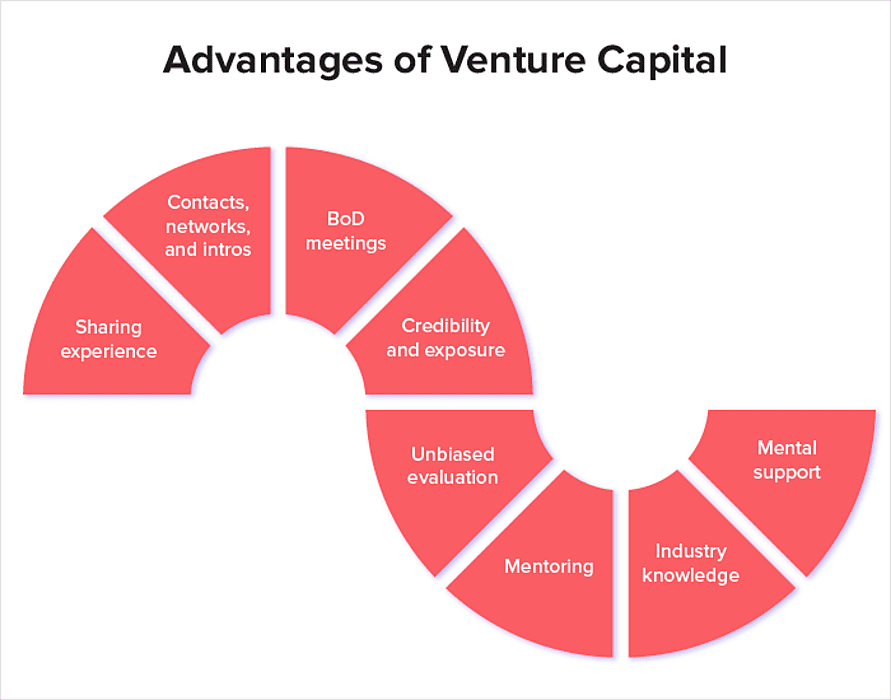
Finding a suitable funding option and source is one of the most crucial challenges when launching a new business. There are several ways of funding a startup and Venture Capital (VC) is one of the many options available to business owners.
And in this article, we will be discussing VC in detail. We will look at how VCs can help startup founders after closing a deal.
Further, we will look at the list of things a VC will look for when choosing a startup to invest in. Lastly, we will consider the things you keep in mind while considering a VC. Let's begin!
Ways VCs can help startup founders after closing a deal

A venture capitalist is typically considered an investor who contributes money to firms in exchange for equity. That is only partially accurate, though. Typically, venture investors seek a high rate of return on their investments. Without coaching founders, sharing expertise, resources, and experience—and even offering mental support—it will be challenging to achieve this high return. VC helping startup founders in these areas is a common sight nowadays. So, what is Venture Capital? It's not just about money; it's about fostering growth and success through active involvement and support. Understanding the stages of venture capital is crucial for both investors and entrepreneurs to navigate this dynamic ecosystem effectively.
An early-stage venture capitalist should assist startup founders in the following ways; these actions are what set a great investor apart from a just average one:
1. Sharing experience
Entrepreneurs and accomplished doers and VCs contribute their important insights and problem-solving abilities gained through years of successfully navigating obstacles in their firms. The fact that venture investors have invested in numerous startups, as opposed to founders who are only focused on one, makes their knowledge of prior failures and lessons learned much more valuable to founders.
They can aid founders in avoiding such circumstances. So, remember that having other entrepreneurs from the VC's portfolio around will strengthen the founders.
2. Contacts, networks, and intros
An investor may be able to create more opportunities for forming strategic alliances by using their relationships. An investor's network may assist in forming partnerships with other firms. It may strengthen the user acquisition marketing plan, for instance, through cross promotions, guest blogging, different referral programs, and email integrations with partners.
Additionally, early-stage VCs are always interested in receiving later rounds. They assist with growth, expansion, and funding while introducing founders to additional investors.
3. BoD meetings
Early-stage VCs frequently hold a position on the board of directors of startups. Most BoD meetings occur once every three months, during which the founding team presents measurements, outcomes, and future financial projections. These sessions are helpful for both operational problems and creating strategic ideas, and seasoned VCs frequently offer insightful guidance on both of them.
4. Credibility and Exposure
If you have venture capital backing, it signifies that someone trusts you to handle their money. That is a standard for credibility. The fact that you have already acquired money indicates that you are resilient enough to complete the contract and have enough runway if you are a VC-backed B2B software business serving enterprise clients.
If founders want to borrow money, this is also a positive sign for banks, and it is no surprise that growth-stage VC firms are interested in founders. They frequently imitate the portfolio firms' triumphs of their counterparts. That kind of visibility is what business owners require.
5. Unbiased Evaluation
The venture capital team members evaluate startups on a third-party basis because they are outsiders. They frequently enquire and evaluate your intentions, effort, and execution critically. Founders must pay attention to those concerned about their expansion but not involved in day-to-day operations.
To open the founder's eyes to some important actions and prevent tiny difficulties from becoming huge issues, a VC may be the greatest counsel because they anticipate the startup's growth and therefore think strategically.
6. Mentoring
In the early phases of any startup, the founders are vulnerable and need mentoring to help them avoid fatal errors, save time, and scale their firm. A VC won't instruct you on how to run your business, but they can work with you to develop a strategy or provide advice on decision-making or expanding, for instance.
For most entrepreneurs, including serial ones, systematic peer-to-peer interactions with constructive criticism are essential. By investing their resources and time during such meetings, investors provide this assistance and share their ideas.
7. Industry knowledge
A common industry emphasis for venture capital firms' funds is B2B SaaS, followed by MedTech, the Creative Economy, etc. This indicates that the VC team has observed hundreds of technology firms and has likely worked in the industry where each founder is now developing their startup. They can impart a wealth of information to entrepreneurs as a result.
For example, we have data-driven tools at our venture capital business that track industry benchmarks. Founders shouldn't undervalue the advantages that come from having such knowledge.
8. Mental support
It is comforting to know that someone has your back when you go ahead with your startup venture. Most venture capitalists are skilled administrators and decision-makers who understand how to support business owners. An investor who was once in the same situation as the founder may be the best person for the Founder to shout SOS to when they need support. If founders feel they can't be particularly sensitive with their clients or colleagues, an investor who was once in the same situation may act like a therapist.
What do VC investors look for in a startup before investing in it?
So, what qualities do venture capitalists seek in a company? Although necessary, a "nice idea" is insufficient. Venture capital decisions also consider the team, the concept's demonstration, the market's magnitude, and the investment terms. If you ever think of becoming a venture capitalist, then you should have a bit of knowledge about the criterias they look for in the startups they think about investing in. So, the things that VC takes into consideration are-
1. A potent team
VCs make investments in people as well as companies. Investors in startups want to see a team that is "all in" right away, with or without the funding. The theory is that if a team can successfully navigate the "bootstraps" stage of growth and is enthusiastic about its product or service, it will have the willpower to overcome any challenges that arise later on.
Additionally, VCs look for a team that supports the founder's vision and has the necessary knowledge and expertise to meet the obstacles that will arise as the company grows. Smart entrepreneurs construct their core teams in a highly smart way, turning them into valuable sources that VCs find appealing.
2. Leadership potential
The founder/CEO will be one of the first individuals the venture capitalists will meet. Why is he or she there? Is the speaker charismatic and effective in speaking? Do they appear entirely dedicated? Are they ready to listen and accept guidance? Do they appear composed and capable under pressure? Do they look like they could address issues and make changes if the company encountered difficulties? Do they have a love for and expertise in the field in which they work? These signs frequently let VCs know that the founder has a chance of being successful. A strong CEO can help a founder if they believe they are weak in this area.
3. Innovative product
Venture capitalists want to invest in companies that either offer customers a compelling reason to change their behavior or something truly unique. Venture financiers seek out products with strong differentiators for this reason. They will seek to ensure that customers have no reason to use their competitors' goods or services in their place. Why would consumers switch to your product if they already utilize a comparable good or service?
4. Proof of concept
Even though venture capitalists frequently invest in startups or fledgling businesses, they nonetheless want evidence of the viability of the enterprise. They want to observe growth in your primary market. This entails going beyond simply having a product idea and demonstrating that consumers are willing to pay for it (outside of family and friends). The VCs will be dubious if this is not a deliberate and wide-ranging part.
5. A plan outlining how the capital will be used
A venture capitalist won't want to invest in your company if they don't know what the funds will be used for, which hopefully goes without saying. A financial forecast will be quite useful in this situation. A financial projection will specify where the money will go and when. It will show how this is anticipated to affect sales, cash flow, operating costs, and the bottom line using historical patterns and informed guesses.
6. Fair cash burn rate
A venture capital fund is probably going to look at your cash burn. How much do you have now, and when will it be gone? This is known as your "runway." The total amount of operational expenses you incur each month is known as your gross burn rate.
If your business is currently making money, the amount left over after operating expenses and COGS is your burn rate. You may determine your "runway," or how long you have before burning through your existing cash, by taking the amount of money you have in the bank and dividing it by your monthly burn rate.
7. Conversion proof
Investors in venture capital want to show that you can convert prospects. They are interested in learning about the various client categories and how to reach them. They also want to observe that there aren't many obstacles in the way of purchase and that the procedure for converting customers isn't overly different.
Things to keep in mind while selecting a VC for your firm
It's just as important for you to choose a VC as for a VC to choose a startup to invest in. The following considerations should be made when choosing the best venture capital firm for you:
1. Plot out your investment plan
First and foremost, confirm that working with a VC firm would assist your business. The company will experience big changes as a result. For instance, the conditions of such a partnership might entitle one to 20% of the business. Verify that the amount of money equals the correct valuation.
This kind of investment plan might not be appropriate in all circumstances. Startup businesses with a full board of directors and a healthy cash flow occasionally could not gain anything from working with a new investor. The new business may discover that it is well-positioned to move forward and expand on its own.
2. Check for established companies
Find well-established capital venture companies with a track record of success in your niche. Finding a company with extensive industry understanding in your particular sector will need some study, but it will be worthwhile in the long run.
3. Think about in-house investor firms
Nowadays, increasingly significant technology companies have internal venture capital firms. A company like Google, for instance, has an internal investor firm called Google Ventures. These businesses appeal to me since their entire business model involves pouring resources back into technology startups. These businesses are consolidating their position in the market. So, you should go for such in-house investing firms.
4. Check for ideological and ethical compatibility
A startup and a VC company need to mesh well on several levels. The principles need to be in alignment. Finding an investor knowledgeable about your market and who has achieved success there. A venture capital firm that shares its business philosophies and viewpoint on company development is another important resource for startup businesses. An investor must get along well with the top management team of the startup business. The investing firm may bring in money but can provide a new set of issues if you don't have the ideal fit.
5. Forge a partnership
When you finally find the right match, be prepared to enter this union with assurance. Make sure they are folks you want as your teammates because you will be working with them for the next five to eight years. They are your new business partners, and you shouldn't take that responsibility lightly. Early on, set the stage for a successful alliance.
Conclusion
After just two or three conversations or meetings, it might not be clear whether a VC will assist entrepreneurs in achieving unicorn status or act as a barrier. Founders should always conduct reverse due diligence and speak with several portfolio companies like the VC to see whether the VC would benefit them. VC can help founders in significant ways, as seen above.
Apart from these, VCs can also help get your product reviewed. With the help of venture capitalists, startup founders can now venture into different avenues and industries and see where they stand as a company. With online forums and communities, startups can now venture capitalists of their choice to invest in their startups.










